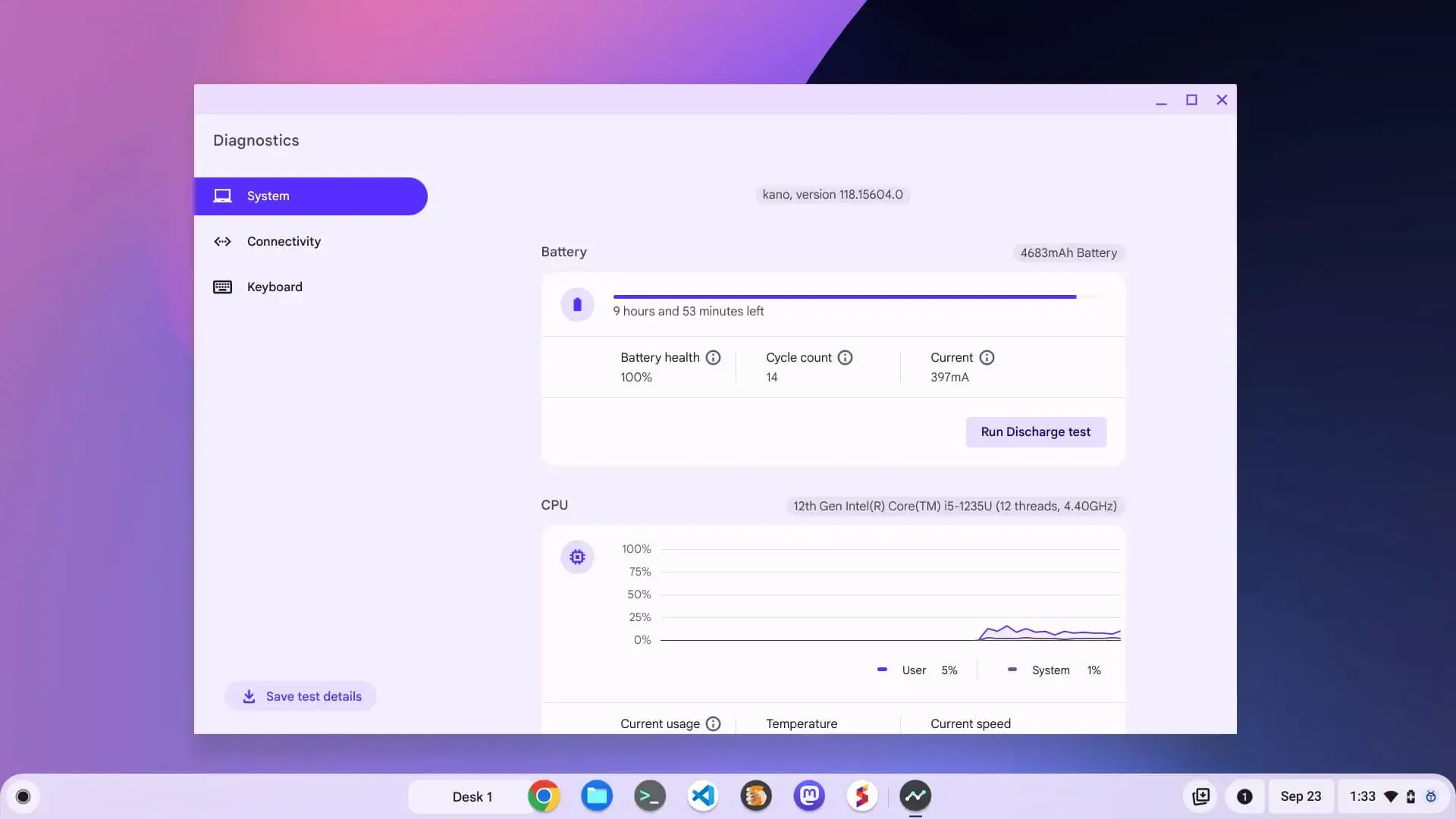I don’t understand the point of this article. It said all that it had to say with the headline alone. Everything else is filler.
“ChromeOS is Linux in disguise. But people already knew this.” Ok. And?
Welcome to journalism in 2023. You don’t write anything out of passion anymore, you’re just filling your weekly quota with random words
How much did you pay for journalism last month? And yet you expect quality and passion.
I don’t expect quality from them, that’s why I don’t really pay attention to corporate journalism. I get most of this kind of information from individual creators, and I do support those when I can
Good for you, and I’m impressed by your undefensive and unhuffy reply.
Because the amount of entitlement I see about professional journalism really pisses me off, personally. There is a reason that much (not all) journalism is not the quality it used to be. It’s because nobody is frigging paying for it any more. Journalists are not the perpetrators in this story, they are the victims. The internet has caused their profession to implode. It’s their jobs that have disappeared on a huge scale, their salaries that have shrunk, their career choice that turned out to be a catastrophic bad move. All because of a technical innovation, basically. Well, personally I think we may come to regret the demise of this profession which served society well for at least a century. But the least we can do is stop the victim-blaming.
Rant over. No, I am not a journalist. Very glad of that career choice.
ChromeOS is Linux with Google’s desktop environment
Always has been. One does not “use Linux” they use an operating system built on top of Linux.
Chrome is not Linux, but Xfce also is not Linux. Gnome is not Linux. KDE is not Linux. Linux is Linux.
Originally, ChromeOS was the Chrome browser with just enough code to boot to and take care of other essential OS functions. Like, the system settings and browser settings were practically merged.
The author is alluding to more recent efforts to untangle and separate ChromeOS from the Chrome browser. I believe the goal is for the Chrome browser on ChromeOS to be essentially the same as other Linux browser builds.
So these days ChromeOS is structured more like other Linux distros, with a huge difference being how locked down it is.
[Insert GNU/Linux interjection copypasta]
[Drama arises between intergnulactic forces]
There is a common understanding of what a Linux Desktop look like.
Whether you run Gnome, KDE or XFCE, you can install the same software and when you open a terminal you can do more or less the same thing.
ChromeOS however have a completely different user space. A bit like Android, yes it uses the Linux kernel but it’s not what people think about when they talk about a Linux Desktop.
deleted by creator
literally, all Chrome OS / chromium OS needs to do for me to actually embrace it. is native out of box flatpack support
one issue I might see them having with flatpack, is the permissions right now are handled kind of stupidly IMO. but if those get solved I think flatpack would be a great addition to chromium os ecosystem
While this would definitely be useful and make linux software more accessible, I’m worried about something similar to Android’s Google Play Services eventually happening where almost every piece of software, despite being for an open source operating system, depends on proprietary google software
Im not too worried myself, it’s worth noting that I myself am perfectly fine using a fully foss android phone with the sole exception of discord, since even the webclient for that sucks. it is possible they could eventually go down that path, but as long as the option is there for foss I don’t really mind too much
As long as you have a Crostini-capable ChromeOS device, you can run flatpacks. This is actually the preferred way to run Firefox (via the Linux Flatpack).
crostini is still in a vm (albiet crosvm is really good) I would really prefer real native
The virtual machine adds valuable security isolation with hardly any performance penalty. What’s the drawback?
there is a noticeable perf penalty on devices I’ve tested, particularly around gpu (but that may change in the future) it’s also just kinda a bit annoying for normal folk to use i’ve found
And not spy me across the OS, which it probably will.
there are forks of chromium OS like thoriumOS, I could see an “Ungoogled chromiumOS” being a viable path to go down
IMO you’re just better off using Debian with their DE directly, then. ChromeOS doesn’t provide anything extra, just a different DE.
chromeOS provides a LOT. its very easy to use and quite reliable, and its super easy computer illiterate people to get into.
I have tried most distros, pretty much every single one that claims to be user friendly. not a single one holds a candle to chrome/chromiumOS.
for a lot of people chromeOS is genuinely a good experience that Linux simply cannot replicate. the polish is very much beyond what other distros provide.
When I tried it, it seemed like mostly just Debian with another DE, but maybe I/you haven’t tried it recently enough…
Also,
for a lot of people chromeOS is genuinely a good experience that Linux simply cannot replicate.
It’s literally Linux.
traditional linux distros, sorry thought the implication was obvious.
but the user experience really is different, its been great since my family and old customer base love it and need a lot less help with it
Flatpak is still in the packager teething stage - it’s going to be a couple/few years before all of the packaging and permission kinks are worked out. There’s already progress, I’m spending a lot less time unfucking flatpak permissions with flatseal than I was in 2019.
The absolute last thing I’m going to do is use a Google product.
They have the best security of any desktop OS iirc
You’re not safe from Google though. And that’s quite a big backdoor if you’re a target of interest.
Forgot the /s
Security, not privacy
ChromeOS has sandboxing, which already puts it miles ahead of Windows and Linux (no, the Flatpak Sandbox doesn’t count)
It’s not the only desktop OS that has sandboxing.
windows sandbox is… getting there, macos is decent but iirc the app dev can choose to not use it. all Linux options require user intervention to ensure it’s set up properly. ChromeOS’ sandboxing technique is inherited from Android and is the strongest/strictest of any desktop operating system.
Now more than ever, ChromeOS is Linux with
Google’s desktop environmentGoogle spyware and nothing elseYou need another ~ at the beginning and end to get
strikeout.
ChromeOS is just spyware that’s eye candy.
Does anyone actually buy Chromebooks apart from schools?
So sad and unfortunate that we’re indoctrinating children to be spied on.
Does anyone use Adobe apart from schools? Yes, because the students who used it at school went to work and wanted to use it there.
Some adobe products are way ahead of the competition (patenting useful stuff) and they integrate nicely with each other. I don’t use them out of principle but that’s why people use them.
I love my chromebook, 90% of the time when I’m lazing around nothing I need uses more than a browser, although it also runs a debian variant and can run android apps, which is useful occasionally. It’s light, doesn’t get remotely hot, has no fan noise and the battery lasts ages.
My mother has one because she doesn’t need the complexity of windows breaking everything… she only needs gmail and facebook.
My girlfriend bought a really cheap one from Lenovo. Besides watching movies and browsing the web there’s not much you can do because ChromeOS is extremely limiting. Wouldn’t ever recommend anyone to buy anything with ChromeOS on it.
Sounds like the perfect device for my parents and many many other people I know.
My parents, for whom the internet is the only worthwhile thing a computer can be used for, love their Chromebook
They’d probably love a Linux system not by Google just as much.
You could try Mint, it’s pretty friendly in my experience, the GUI installer (with the full apt and flathub repos) helps, and Mint can support auto updates which will help the non-tech savvy a lot!
You over estimate how tech savvy my folks are. Dad doesn’t even know how to fully shut down the computer
“The button on the computer that also turns it on”
Also, this is exactly why the OS should auto update for people like them, rather than them having to use the updater and fill in their password and whatnot
Yep, my parents have a few. Way easier than dealing with them installing windows malware constantly or having to maintain Linux for them.
Just keep in mind that after update support ends, it’s a ticking time bomb. And there’s basically no “second life” for it because it’s so locked down.
I mean, it was for on campus use, but I bought one in college to have a cheap note taker and basic homework machine for on campus that wouldn’t set me back too far if it got stolen or broken. I had a gaming desktop at home and was in a non-technical major, so it worked out great.
I bought one used as a Couch PC and replaced ChromeOS with a proper linux install.
I sure hope not 😅
I had a tiny Dell Chromebook 11 through college running arch. It had a 10/10 keyboard and a decent IPS display, paired with an efficient bitmap font it was perfect for my needs. I should grab one off eBay, it looks like they’re only $40 or so now.
Yes
I’m wondering the same thing. Chromebooks cost way too much for what they are.
Unless you go with “high spec” one they are all basically under £350 and generally way cheaper than that.
Is that not cheap?
And this is the reason why it does well in schools.
That is cheap, but if you go to Google’s own page about Chromebooks, the options you see there are all in regular laptop pricing territory. Does anyone actually buy Pixelbooks or gaming Chromebooks?
yes but no. the pixelbook was by far and away the nicest build quality of any laptop I’ve owned, and the Linux containers has basically made it a normal laptop other than requiring chrome. with that said, I bought it second hand for ~$200 would never have even considered it for its original $1000 or whatever it listed at.
ChromeOS is also the most secure desktop focused os you can get so I usually use it for banking and stuff like that.
I would definitely get a Chromebook, but only once you can change the default browser from Chrome without needing to do any weird workarounds like Android apps
As someone who has owned a Chromebook for several years, I can tell you that you shouldn’t. Hardware wise it’s hard to beat Chromebooks at their price points, but the complete lack of control over the system is a deal breaker. I don’t have time to list all of the issues I’ve had. In many cases what would have been trivial fixes on a normal Linux system required full reinstalls on chromeOS. Like the time I accidentally filled up the fairly modest system storage. The system refused to allow me to delete anything, requiring a reset just to get local file management abilities back.
I ultimately ended up installing full Linux on it, which ended up being a whole other ordeal due to all of Google’s “security” features.
Do you have to jailbreak the hardware to install another OS or is it supported?
There are 2 ways to do it, either via depthboot(software only, no custom firmware, lots of manual OS prep, 0 risk) or custom firmware(maybe physical, model dependant, no os prep, small risk). For custom firmware you usually have to either bridge an internal jumper, unplug the battery, or build a custom cable, depending on your model.
While it is allowed it’s not supported by google.
I would never recommend buying a Chromebook with the intention of replacing the OS unless you’re looking for a project or you’re getting it for cheap.
TLDR it’s harder to replace the OS on a Chromebook than a Mac, and you get none of the benefits of Mac hardware.
It kinda crazy you can’t do this, wasn’t Microsoft forced to let you change default browsers in an antitrust suit?
Its okay, once Microsoft introduces EdgeOS, they can claim that Edge is an integral part of the OS, and therefore cannot be removed.
…oh wait, that’s just Windows 10 onwards
Does this mean I can reasonably expect to buy a Chromebook and install vanilla Linux without huge headaches?
There’s always been Linux distros that targeted Mac hardware. There’s got to be something like that for chromebooks, right?
deleted by creator
You can install vanilla Linux, but huge headaches are involved.
I did it, and it worked, but I had to open is and remove a foil (equivalent to a jumper), go to developer mode, then flash a new bootloader by running a script from GitHub.
Think flashing a ROM on a pretty locked down Android device.
The upside is that when the process is done, you have a regular PC and no need to do any cumbersome process again.
Chromebooks use some custom tailored coreboot variant, right? Not surprising that they’ve locked it down while they were at it.
Not even remotely. It requires custom firmware which often requires physical disassembly to install. From there you can install any distro, but you will continue to have many small issues and inconveniences often due to the nonstandard keyboard.
There was a Chromebook targeted Linux distro called eupnea that could be installed without custom firmware via depthboot, but it’s dead now and the original repo got deleted after the Dev got hacked, so the build scripts don’t work anymore.
No, this isn’t something you can expect.
There used to be a distro called Gallium OS, but it’s been dead for a couple years now.
Not always, I have one with an amd chipset that I can’t get Linux on (last time I checked).
You have to open them up and remove a screw then install different firmware.
The dell Chromebook 11 I got from eBay for under £20 was easy to get it working on though.
Why would you not be able to? Isn’t a chromebook just a laptop with garbage specs?
Not really. A Chromebook to a laptop is basically what a gaming console is to a desktop pc. Yes, it shares a lot of hardware, and the ISA too these days, but even then a lot of it might be trimmed down without any notice, or on the software side, you might be locked into what you get. They did make it easier to install Linux flavors, bit you still get what you get
the true wysiwyg device
There are actually Chromebooks with very solid specs, but no, it isn’t that simple. They have custom firmware and components that often don’t play well with Linux, or Windows for that matter.
Okay, thanks for clearing this up. Chromebooks have turned me off since their inception, I just assumed since they are made by regular laptop companies that they are plain old low-spec machines running a lightweight OS with minimal functionality.
ChromeOS is a totally locked down distro of Linux. I prefer Debian Linux with an XFCE desktop thank you.
Maybe I’m mistaken on this, but I’m fairly certain the screenshot they describe as “Unity” is just a heavily themed GNOME. Also, I’ve never seen Xfce stylized as “XFCe.” I realize that’s not the point of the article, but just something that stood out to me.
That is actually Unity. It’s a mildly modified version used in Ubuntu Unity. Also, Xfce was also misspelled as XCFe.
Unity is GNOME, but it’s the official name of Ubuntu’s customized GNOME.
deleted by creator
No it’s not, Unity is a separate project that Ubuntu retired, but fans have kept it alive.
It’s “technically” both. Ubuntu called their themeing Unity because that’s the desktop it’s supposed to emulate the style of.
Hilarious title. Can you install Firefox?
Can you uninstall Chrome?
But that would turn them into books.
Mission accomplished.
Check chromebrew too https://github.com/chromebrew/chromebrew/tree/master/packages
You can install from Android or from linux environment, but last one is a virtualization and it’s a bit slow.
It always was.
And yet an onscreen keyboard for linux apps is still “on the roadmap”…
I mean, that’s the case for KDE too, so can’t really throw stones there.
With wayland this also happens in the rest of linux.
Quite possibly one of the most misleading statements ive ever read.
























